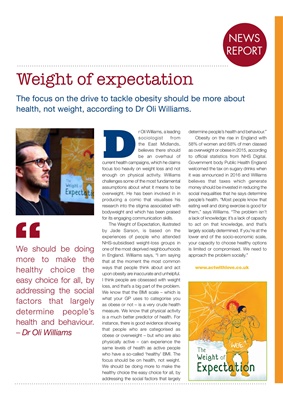
NEWS
The focus on the drive to tackle obesity should be more about
health, not weight, according to Dr Oli Williams.
Dr Oli Williams, a leading
sociologist from
the East Midlands,
believes there should
be an overhaul of
current health campaigns, which he claims
focus too heavily on weight loss and not
enough on physical activity. Williams
challenges some of the most fundamental
assumptions about what it means to be
overweight. He has been involved in in
producing a comic that visualises his
research into the stigma associated with
bodyweight and which has been praised
for its engaging communication skills.
The Weight of Expectation, illustrated
by Jade Sarson, is based on the
experiences of people who attended
NHS-subsidised weight-loss groups in
one of the most deprived neighbourhoods
in England. Williams says, "I am saying
that at the moment the most common
ways that people think about and act
upon obesity are inaccurate and unhelpful.
I think people are obsessed with weight
loss, and that's a big part of the problem.
We know that the BMI scale - which is
what your GP uses to categorise you
as obese or not - is a very crude health
measure. We know that physical activity
is a much better predictor of health. For
instance, there is good evidence showing
that people who are categorised as
obese or overweight - but who are also
physically active - can experience the
same levels of health as active people
who have a so-called 'healthy' BMI. The
focus should be on health, not weight.
We should be doing more to make the
healthy choice the easy choice for all, by
addressing the social factors that largely
Weight of expectation
We should be doing
more to make the
healthy choice the
easy choice for all, by
addressing the social
factors that largely
determine people's
health and behaviour.
- Dr Oli Williams
"
NEWS
REPORT
determine people's health and behaviour."
Obesity on the rise in England with
58% of women and 68% of men classed
as overweight or obese in 2015, according
to official statistics from NHS Digital.
Government body Public Health England
welcomed the tax on sugary drinks when
it was announced in 2016 and Williams
believes that taxes which generate
money should be invested in reducing the
social inequalities that he says determine
people's health. "Most people know that
eating well and doing exercise is good for
them," says Williams. "The problem isn't
a lack of knowledge; it's a lack of capacity
to act on that knowledge, and that's
largely socially determined. If you're at the
lower end of the socio-economic scale,
your capacity to choose healthy options
is limited or compromised. We need to
approach the problem socially."
www.actwithlove.co.uk